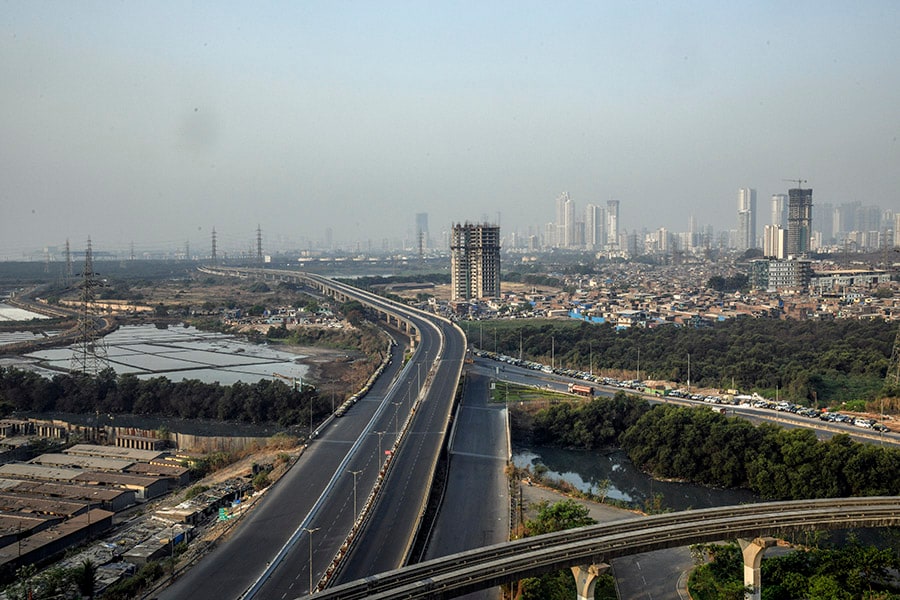India, Day 1: How the world's largest coronavirus lockdown could impact the econ
India's 1.3 billion people have been told to stay at home. For some, it will mean starving, and an already fragile economy may collapse


 The eastern expressway in Mumbai, India, on Wednesday, March 25, 2020. It is the first day of the world’s biggest coronavirus lockdown, 1.3 billion people — nearly a fifth of humanity — ordered to stay inside unless vitally necessary. Image: Atul Loke/The New York Times
The eastern expressway in Mumbai, India, on Wednesday, March 25, 2020. It is the first day of the world’s biggest coronavirus lockdown, 1.3 billion people — nearly a fifth of humanity — ordered to stay inside unless vitally necessary. Image: Atul Loke/The New York Times
NEW DELHI — India’s economy was sputtering even before its leader announced the world’s largest coronavirus lockdown. Now the state-ordered paralysis of virtually all commerce in the country has put millions of people out of work and left many families struggling to eat.
On the first day of the nationwide 21-day shutdown of nearly all services Wednesday, the streets of Mumbai, India’s largest metropolis — usually so busy it is known as Maximum City— were silent. Shuttered shops, empty train tracks, closed airports and idle factories all across the country were signs of the economic impact of the social distancing that the Indian government said was necessary to prevent new coronavirus infections.
India has reported 606 coronavirus cases so far, but with the population density so high and the public health system so weak, Prime Minister Narendra Modi ordered the country’s 1.3 billion residents to stay inside to keep India from sliding into a disaster that could potentially dwarf what China, Italy, Spain, the United States and other countries have faced.
But Modi’s effort to prevent the spread of the virus will lead to its own calamitous damage.
Manual laborers have no work, farmers cannot tend fields, online retailers and pharmacists have been harassed by overzealous police officers. Countless people have been running out of cash.
“The kind of devastation that is going to be faced by the bottom 50% of the workers in the informal sector is unimaginable,” said Jayati Ghosh, an economist and professor at the Jawaharlal Nehru University in New Delhi.
In some places, police officers have staked out roads and highways, stopping motorists and demanding to know why they were outside. Several states have closed their borders, forcing cargo trucks to simply park by the roadside.
Flipkart, the country’s largest online retailer, found it so difficult to move people and goods that it suspended delivery of everything except food.
Grocery stores were allowed to remain open, and in the cities, crowds swarmed and emptied the shelves. At an upscale market in New Delhi, one man stuffed his Mercedes with groceries Wednesday afternoon, jumped behind the wheel and zoomed off — wearing blue rubber dishwashing gloves and a snorkeling mask.
The National Restaurant Association of India estimated that perhaps 20% of the 7.3 million restaurant workers will permanently lose their jobs as employers go out of business. “Many companies may not survive this onslaught,” said Anurag Katriar, the association’s chief executive and the owner of a chain of upscale eateries.
Harcharan Singh, a vendor in rural Punjab state who usually goes door to door peddling everything from oranges to cauliflower, has had nothing to sell for days. The big wholesale food markets he normally relies on have all been closed.
“Our business is completely shut,” he said. “We need this money to survive, get food for our families.”
Hundreds of millions of Indians are like Singh, with little or no savings. Rickshaw drivers, for example, buy food for their families with the money they make that day. Banned from the roads, many drivers do not know how they will survive.
Economists at Barclays predicted Wednesday that the lockdown would last a month and shave 2 percentage points off India’s anemic economic growth rate. Although India is likely to escape a recession, Barclays said, such a significant slowdown would mean rising joblessness in a country where millions of young people enter the workforce every year.
Modi acknowledged the trade-offs in a televised address Tuesday night, when he first announced the nationwide lockdown.
“No doubt this lockdown will entail an economic cost for the country, but saving the life of each and every Indian is the first priority for me,” he said. “If we are not able to manage the next 21 days, then many families will be destroyed forever.”
Economists are urging the government to create a huge stimulus package to blunt the effects of the lockdown.
India’s government stores an enormous grain supply, which could quickly be distributed to the poor, said Dharmakirti Joshi, chief economist at CRISIL, a Mumbai-based credit ratings agency.
Joshi also urged direct cash payments to individuals, and loans to small and medium-size businesses. “Give a clear signal that you will help,” he said.
The Modi administration is deliberating what kind of stimulus to offer and a plan is expected to be unveiled within days.
First Published: Mar 26, 2020, 12:01
Subscribe Now